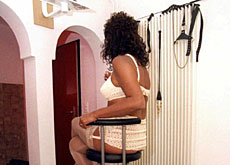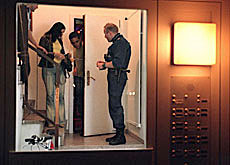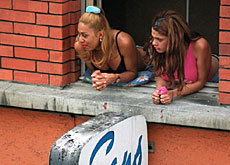Zurich buys brothels to clean up red light area

The authorities in Zurich are buying brothels in the city’s notorious red light district, Langstrasse, and converting them into housing as part of efforts to clean up the area.
But while up to 20 “salons” have been forced out, the number of prostitutes working the streets continues to rise.
The initiative forms part of the “Langstrasse Plus” project, launched three years ago to improve conditions for residents in a neighbourhood synonymous with drugs and prostitution.
The latest drive has seen the city authorities buying or underwriting the sale of buildings leased out for use by the sex trade.
One property owner whose building had been rented out to prostitutes sold it to the city council for SFr1.7 million ($1.3 million).
It was then renovated at a cost of SFr900,000 and converted into apartments for young people.
Though the scheme has been partially successful, both police and city officials admitted earlier this week that they still had their work cut out.
“The criminal gangs are constantly changing their tactics,” said Rolf Vieli, who heads Langstrasse Plus.
Stability
“We are far from being on top of the whole situation,” said Esther Maurer, the city’s police director, “but we are preventing it from getting any worse.”
Langstrasse, which lies behind the northern Swiss city’s main railway station, is home to around 40,000 people.
But families have been steadily moving away over the past decade and the exodus is predicted to continue for the next 20 years.
The non-stop stream of clients seeking sex and drugs creates a constant nuisance for those who remain.
More than 3,000 prostitutes are officially registered with the city authorities and have the right to ply their trade in areas where more than half the tenants are businesses.
They can also solicit on certain streets – but, ironically, not Langstrasse.
Police estimate there are also several hundred illegal prostitutes employed in the city’s sex trade.
Proof of the steady march of prostitution can be seen in the growing number of registered sex workers. Last year there were a record 513 new recruits (including 30 men) – up 40 per cent on 2001.
Recent estimates suggest that there are around 11,500 prostitutes at work across Switzerland, three times as many as a decade ago.
Sex trade
The Zurich authorities say they are anxious not to limit prostitution to one or two specific areas – a strategy pursued by some Swiss towns and cities.
“This type of ghettoisation, as seen in the Netherlands, leads to dangerous living and working conditions for prostitutes,” said Vieli.
Instead, the city is striving for a compromise that makes life bearable for residents. Its success depends on making the streets safe, ensuring children can play in the parks, and also reclaiming property from the sex trade.
Over the past year the city council has bought or underwritten the sale of a number of buildings through a foundation. It is also renovating several of its own properties.
Prostitutes are also now banned from displaying their wares in windows – which has further improved the situation, says Maurer.
Making progress
Officials in Zurich say the results of their efforts speak for themselves.
Businesses which a year ago were threatening to leave the area have decided to stay. Young artists and restaurateurs are moving in, even though banks are reluctant to lend them money.
“Up to 20 brothels have closed down and moved to other areas on the outskirts of Zurich,” notes Vieli. “In these areas, clients don’t have parking problems and don’t cause a nuisance.”
“Madams who feared their business would collapse ended up suffering only a temporary fall-off in trade. Things picked up very quickly.”
swissinfo, Ariane Gigon Bormann in Zurich
In spring 2003, the city authorities started buying buildings to stop them being used for prostitution.
One building was bought for SFr1.7 million ($1.3 million) and renovated to the tune of SFr900,000. Other sales are currently being negotiated.
On a number of other occasions, the city has underwritten building sales and eased planning regulations to allow new flats to be built.
Registered prostitution in licensed brothels has been permitted across Switzerland since 1992.
But street prostitution remains illegal, except in certain areas specifically designated by local authorities.
There are around 3,000 registered prostitutes in Zurich.
Police estimate there are several hundred working illegally.
In 2003, 513 new prostitutes were registered.
There are around 300 registered brothels in the city.

In compliance with the JTI standards
More: SWI swissinfo.ch certified by the Journalism Trust Initiative


You can find an overview of ongoing debates with our journalists here. Please join us!
If you want to start a conversation about a topic raised in this article or want to report factual errors, email us at english@swissinfo.ch.